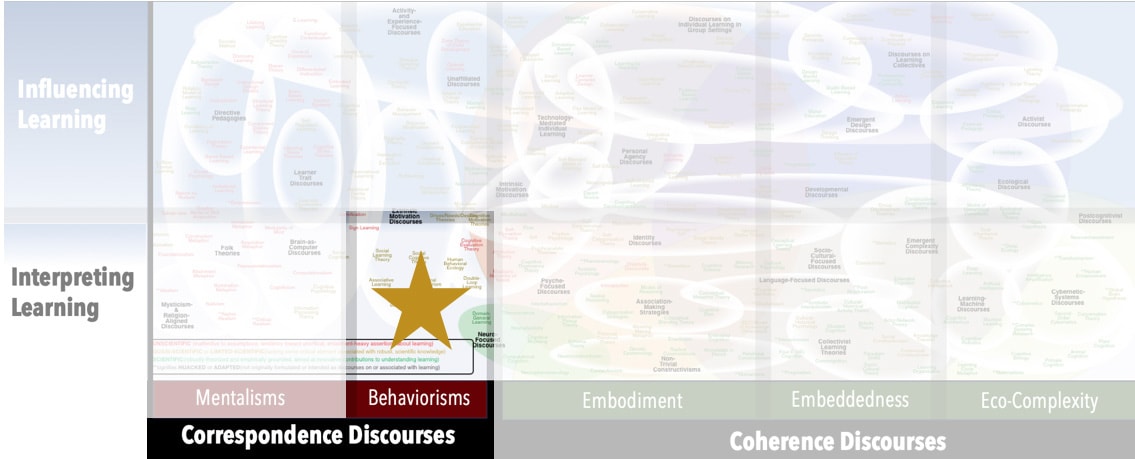Focus
Associations between identifiable environmental stimuli and observable measurable behaviorsPrincipal Metaphors
- Knowledge is … repertoire of action
- Knowing is … behaving (triggered by stimuli)
- Learner is … an organism
- Learning is … changes of action (triggered by and impacting on environment)
- Teaching is … conditioning (increasing or decreasing the probability of specific behaviors)
Originated
1950sSynopsis
Radical Behaviorism is closely aligned with Methodological Behaviorism, but expands on the latter’s strict and narrow focus on observable behaviors. Radical Behaviorism includes considerations of thought, emotion, and other not-directly-observable mental processes. Thus, Radical Behaviorism problematizes the assumption of most Behaviorisms that learners (especially human learners) are mechanical respondents whose actions are entirely shaped and determined by their contexts, opting for a perspective that acknowledges the agency of the learner and the interactive, co-specifying effects of the learner and the environment. Associated constructs and discourses include:- Complex Behavior – an activity that emerges from multiple interacting factors, is adaptive, non-linear, and often unpredictable. A Complex Behavior involves learning, decision-making, and environmental influences.
- Operationism – the suggestion that a scientific construct can be equated with the measurement of that construct, based on the conviction that the “meaning” of a concept is the same as the operations used to generate that concept (e.g., a reading difficulty might be equated with the score on a diagnostic test)
- Operationist View of Consciousness (Stanley Smith Stevens, Edwin Boring, 1960s) – the suggestion that consciousness can be equated to observable events
- Stimulation Theories (J.F. Wohlwill, 1960s) – discourses that are aligned with Behaviorisms in the assumption that the physical environment is the source of sensory stimulations that trigger particular responses and adaptations, but that diverge from more instrumental versions of Behaviorisms by attending of the subtleties and complexities of any setting. In particular, Stimulation Theories are associated with acknowledgments of the ranges (i.e., in diversity, patterning, and intensity) of stimulations in one’s context, the influence of one’s necessarily unique personal history, and the contributions of the one’s idiosyncratic affective responses.
Commentary
Radical Behaviorism is subject to some extent to the same critiques that are common across all Behaviorisms. However, because Radical Behaviorism is more attentive to and critical of some deep-seated assumptions shared by Behaviorisms and most Folk Theories (as noted above), some of those critiques must be tempered.Authors and/or Prominent Influences
B.F. SkinnerStatus as a Theory of Learning
Radical Behaviorism is a theory of learning.Status as a Theory of Teaching
As with other Behaviorisms, with its core focus on affecting behaviors, Radical Behaviorism offers immediate prescriptions for how to prompt learners to manifest or suppress particular behaviors. Consequently, although explicitly about learning, Radical Behaviorism can be construed as a theory of teaching – albeit one with very limited value in formal educational settings where the diversity of learners, complexity of contexts, and the range of competencies render its insights impractical.Status as a Scientific Theory
With regard to methodology, like most Behaviorisms, Radical Behaviorism meets most of the requirements of a scientific inquiry. However, it tends to fall short on matters of critical attentiveness to its central constructs – a point that is evident in the inability of Radical Behaviorism to account for such phenomena such as human creativity.Subdiscourses:
- Complex Behavior
- Operationism
- Operationist View of Consciousness
- Stimulation Theories
Map Location

Please cite this article as:
Davis, B., & Francis, K. (2025). “Radical Behaviorism” in Discourses on Learning in Education. https://learningdiscourses.com.
⇦ Back to Map
⇦ Back to List
